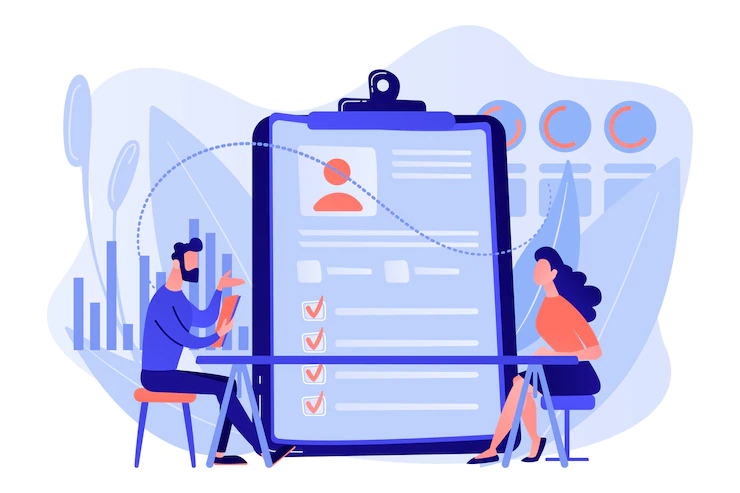It is pretty rare for applicants to get hired on the spot. According to a study, there is only a 1% chance of landing a job right after the first interview.
If you are applying for jobs, please allow some time for hiring managers to decide. While waiting fuels job search anxiety, it is a necessary part of the process. Try your best to be patient and believe that someone out there will eventually hire you. The most important thing is to keep on trying.
Being informed could help ease your nerves. Read the following paragraphs to find out the truth behind job search and recruitment.

How long does it take to get the job?
Candidates typically undergo one to three sets of interviews for a job position. It may take them weeks to go through all of them.
Receiving a job offer after the last interview is a different story. There is no hard and fast rule about when employees should hire you. Every company has different needs and procedures. Besides, no applicant can force a hiring manager to decide within a specific period.
However, based on the estimated average, applicants receive job offers within 20 to 40 days. The results can differ per country. In the United States, the average is within 23.8 days.
Why does it take a while for you to hear back from the hiring manager?
The length of your wait does not guarantee your rejection or acceptance. In some cases, you may need to wait longer than the average before receiving a word from the hiring manager.
Are you wondering why you did not receive a word from them after a while? Here are some of the most plausible reasons:
1. The interview process is still ongoing.
Why are they not replying? They could still be interviewing other candidates, even those outside the position you are applying for.
It is also essential to consider that hiring managers have different timelines. Maybe their deadlines are due at a much later date.
Companies interview as many people as possible to gather an expansive pool of potential employees. Interviewing within a short period may yield homogenous and limited results.
2. They are busy.
Remember that even during hiring season, the HR Department is busy with other things too. Some responsibilities they take care of daily are not limited to processing the payroll, maintaining employee records, and mending internal conflicts.
Sometimes, even if you are a top candidate, hiring managers cannot find time to respond to your inquiries. They may inform you to expect delays ahead of time.
3. The position you are applying for is not a priority.
Some open positions are not for urgent hiring. If the spot you are applying for is one of those, hiring managers may not be as active in updating your application.
They will eventually get back to you, but as of the moment, they will prioritize those that the company immediately needs.
Not being on the priority list does not mean you will not get hired. However, you may need to wait longer before the process continues.
4. Your application is lost.
On average, one job opening attracts about 118 candidates. When the COVID-19 pandemic hit, the numbers grew even more.
Because of the overwhelming number of applications, it is possible for hiring managers to lose yours somewhere. Even if you sent the application digitally, the mix-up is still possible. Send a prompt follow-up if you submitted the job application online.
5. They are not interested in you.
It is a bitter reality that not all employers will be interested in you. Even if you did well during the interview, some hiring managers might not think you are the best fit for the position.
Recall what happened during the interview and find signs that you may not have gotten the job. If you notice enough red flags, moving on to other prospects might be better.
When should you follow up after the interview?
The best time to follow up after an interview is not sooner than one week. Wait for at least five working days before sending an inquiry about the status of your application.
Sending an inquiry too soon is not ideal. It may come off as you are pressuring the interviewers to decide after your demand.
Best practices when following up after the hiring process
Do you know how to call about a job application? Are you aware of the recommended steps in doing so? If you answered no to both of these questions, look at the list below.
These suggestions can help you build a positive relationship with the hiring manager and optimize your chances of being hired.
1. Confirm contact information at the end of the interview
While the interview is closing, you can reiterate to the interviewer the contact details they have given. You could ask for them if they did not hand out any.
Doing this informs the interviewer that you are highly interested in the position. It is good practice because hiring managers look for applicants who take the initiative and are confident enough to raise questions.
2. Be grateful
Whenever you follow up after an interview, always be grateful. Express that you feel honored about the interview and enjoyed the chat you had with the interviewer.
In sending a "thank you" note, your goal is not to gain the interviewer's favor but to show the kind of character you have. Subtle gestures like being grateful can speak volumes about who you truly are.
3. Be courteous
Showing courtesy in business communication helps applicants gain the trust of future employers. Adding a greeting before any message can be impactful. Otherwise, your question might sound disrespectful.
Use pleasantries when asking for an update for the first time. A simple "good day" will already suffice. Courtesy is not only about respect; it also reflects professionalism. Your brash or intrusive questions could define your character as an applicant from the interviewers' standpoint.
4. Be concise
Refrain from sending lengthy messages as much as possible. Get to the point right away. Try to keep your queries short but compact.
To keep your follow-up query concise, you must first identify your questions. Then, only ask the most significant ones and those that do not touch on the same topics.
By asking too many questions, you are passive-aggressively pressuring the hiring manager to work on your application immediately.
5. Send a notice first before calling
Whenever you intend to call, please send a notice. It is best to wait for the hiring manager to respond before you ring their number. If they do not reply at all, refrain from pursuing the call.
Calling without prior notice is rude. Although you have the HR manager's name and contact number, you do not have the right to disturb them at your leisure.
6. Email or call during work hours
It is disrespectful to ask for an update after work hours, on weekends, on holidays, or when hiring managers declare themselves unavailable. After all, hiring managers have the right to their private time.
Furthermore, calling beyond work negatively affects your chances of landing the job. Your act is both informal and improper. You are being disrespectful of other person's time for rest and leisure.
7. Do not send too many follow-up notes
After sending your initial follow-up note, let some time pass before sending another one. If you do not receive any response by then, it is better to assume that you are not moving forward to the next phase.
Sending too many follow-ups within a short time frame is also disrespectful. Never fish out for a response by bombarding companies with repetitive questions.
8. Get in touch with your references
One of the tell-tale signs that an interview went well is when interviewers ask about character references. In preparation for this event, give your listed references a heads up.
Always inform the people you set as character references that you are applying for specific positions. Then, when someone calls for you, they can be ready with their answers. Besides, it is a good gesture to inform character references ahead of time.
What can you do to improve your chances of getting hired fast?
During a job interview, sometimes the smaller things matter more. You can implement a few tweaks to gain better chances of getting job offers within a shorter period.
Review the list we have prepared for you and find things you have not tried before. Our suggestions could change your job hiring experience forever.
- Apply as early as possible. The best time to apply for a job is as soon as possible. The closer you are to the posting time, the better.
- Send out multiple applications. It is unrealistic to pin your hopes on a handful of job openings. You can increase your chances of hiring by applying to more posts.
- Practice your interview skills. Sharpening your interview skills is a must to nail job interviews. Take time to practice and know what to say during specific circumstances.
- Always bring what you need during interviews. Before entering the interview room, check if you have brought everything you need for an interview. To name a few, you need IDs and professional portfolios.
- Dress appropriately. What you wear to a job interview can affect your chances of success. 95% of interviewers already judge applicants based on their attire alone. Not only that, adjust your grooming and accessories according to the type of job you are going for.
- Emphasize what value you can add to the company. Think about how you can make the company better. Advertise your unique skills and talents and explain how these things make you an important asset.
- Look and sound confident. Avoid slouching and making unnecessary movements. Straighten your back and put your hands on the sides. Speak at an average pace and open your mouth so the interviewer can hear your words clearly.
- Build strong connections. Do not underestimate the power of linkages. If you did not get the job in your previous applications, continue to build connections with the company. They might recommend you to their colleagues. Also, they may call you once again after they have more openings.
You job search will end soon
After sending countless resumes and meeting several interviewers, your job search will soon end. Your efforts should lead to satisfactory jobs, if not better.
After weeks, if not months, of waiting, you will eventually receive a job offer that you deserve. Make sure that you are fully ready once that happens.
Claim your victory as early as now! Develop a positive mindset to prepare for bigger and more compelling challenges.
While waiting for the results, explore career development courses to build skills that will make you an even more attractive candidate. Your added expertise will set you apart from the others.


